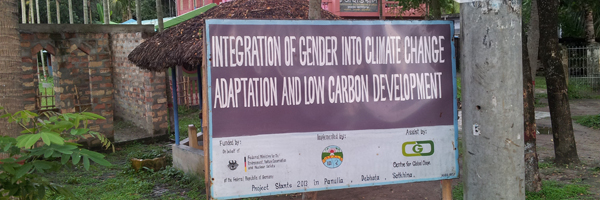Gender in adaptation and low carbon development (Bangladesh and the Pacific)

The project "Gender in Adaptation and Low Carbon Development" identified that climate change affects different regions, generations, income groups and genders differently. In particular developing countries, such as Bangladesh and those in the Pacific region, have already begun to feel the impacts of climate change. Poorer members of the population, including a disproportionate number of woman, are particularly vulnerable and at the same time, key actors. Nevertheless, gender issues have largely been neglected so far in local and national climate policy-making. Women and communities have their own visions and knowledge on how to build and strengthen their resilience to climate change. These visions are tied to the broader realities of power relationships that are informed by class, gender, ethnicity and citizenship.
GenderCC's project was an effort to realise such visions through a joint project with its partners, the Center for Global Change in Bangladesh (CGC), and the Secretariat of the Pacific Community (SPC) in Fiji Island. The Partners promoted gender sensitive approaches in adaptation and low carbon development projects and policies through awareness raising, training and dissemination of information. They developed capacity building and train-the-trainer programmes and worked with a broad variety of stakeholder and local communities.
The partners also worked to integrate gender into national climate policy. This involved lobbying and sensitisation events with policy-makers, including Members of Parliaments and Ministers, meetings with government officials at different tiers, capacity building of government officials, non-government professionals, addressing media, sensitising local government and local people, and organising events with civil society organisations.
One outcome of the project was a Global Learning Platform which GenderCC created as an interactive tool to disseminate the results of these pilots and facilitate joint learning and exchange on gender and climate policy between climate change practitioners (comm.gendercc.net).
The project was extraordinarily rich in terms of the learning materials generated, many of which have paved new paths in gender and climate change theory and policy work. The materials reach across a broad spectrum, from articles and interviews for popular media, to manuals for implementation and academic work. A selection can be found below.
The project was carried out in 2010-2014 as part of the International Climate Initiative, supported by the German Federal Ministry for Environment, Nature Protection and Nuclear Safety.
Bangladesh
In Bangladesh the effects climate change have long been felt by many parts of the population. Many fishing communities have lost their livelihoods due storms and floods cause by rising sea levels. Rain has become unpredictable so that cultivating land has become unprofitable and poor farmers are hardest hit. Forecasts for the future predict that the country will see more frequent and extreme weather conditions and water-borne dangers such as floods, erosion, salinity and humidity will increase. The livelihoods of the poor are going to be increasingly destroyed, which will force people to migrate. Moreover, women will bear the brunt of the negative effects of these developments as their vulnerability is disproportionately higher than that of men.
In 2009, the government of Bangladesh passed a climate change strategy and an action plan. Several years before a ‚National Adaptation Programme of Action’ (NAPA) was developed, in order to further advance climate friendly development and adaptation measures. The government began to provide financial resources for adaptation and asked for the assistance of international organisations.
Until now, main activities on climate change have lacked gender sensitivity. The position of the Ministry of Women and Children Affairs is relatively weak, and cannot enforce women’s rights which fall under the responsibilities of other government departments. Gender issues were thus not taken up in the Ministry of Environment and Forest, which is responsible for climate change. This can be traced back to lacking awareness and capacities within the ministry. Thus, women have had little chance to express their needs and opinion and get involved in climate relevant decision-making.
Project Partner: Center for Global Change (CGC), Bangladesh
CGC is an experienced policy advisor. Moreover, the organisation currently acts as national contact point for gender issues and as a focal point for GenderCC in Asia. The CGC is involved in the promotion of gender aspects nationally and internationally in adaptation and mitigation of climate change. On request of the government of Bangladesh, CGC has conducted the very first research work on the different vulnerabilities of women and men in the context of climate change in Bangladesh. Furthermore, CGC has played a significant role in the "Second National Dialogue" on climate change, and thereafter organised a conference on "Addressing Gender Concerns in Adaptation Discourse: Leadership Awaits Bangladesh" in April 2010. Moreover, CGC has initiated the discussion about gender-sensitive shelters during hurricanes in Bangladesh. This suggestion was according taken up by the National Commission, which thereafter designed adequate shelters.
A number of roundtable discussions and policy dialogues were held in the context of the project, including the national dialogue on “Addressing Gender Concerns in Adaptation Discourse: Leadership Awaits Bangladesh”. This workshop involved different stakeholders, including of participants from the government, donors, NGOs and civil society.
As a result of the meeting, participants urged policy-makers to take action on the a range of issues, including a gender-sensitive relief package, the lack of gender disaggregated data in the area of climate change, alternative income generating activities for women, facilitating institutional credits to women, specifically women headed households, and the sensitization of the media on these issues.
Pacific Islands
Prior to the beginning of the project, the need for women to be actively involved in the implementation of energy security initiatives had already been acknowledged at the regional level in the Framework for Action on Energy Security in the Pacific. This framework thus provided a basis for the implementation of this project by the Secretariat of the Pacific Community.
Low carbon development had not yet been well defined and remained a relatively new concept in the Pacific context. However, it has been identified as an important factor in promoting energy security, where efforts are geared towards ensuring that all people have access to sufficient and sustainable sources of clean and affordable energy and services to enhance their social and economic well-being.
The objective of the project was to promote gender sensitive approaches in adaptation and energy projects and policies by raising awareness, conducting trainings and disseminating information in the Pacific region.
While existing agreements explicitly mention gender as a mechanism of sustainable adaptation and mitigation measures, it was revealed that a gender dimension had not yet been integrated into climate change strategies. This was partially due to a lack of resources among women activists and regional NGOs, as well as within the local government’s department for women’s affairs. Thus, as part of the project, training on gender mainstreaming was conducted in 3 Pacific Island countries, namely Fiji islands, Kiribati and Tuvalu. The trainings were convened for different target groups but with the overriding objective of promoting gender and cultural issues in climate change adaptation and low carbon development.
A number of meetings were conducted at the regional level, including a roundtable meeting on climate change in Niue in 2010 where representatives lobbied for gender integration. Gender and energy training were also carried out in Niue with the relevant stakeholders and a literature report was produced on the capacity of the energy and environment departments to integrate gender in environment and energy projects.
High level interventions, a Women’s Ministerial Meeting and national trainings were also held in Fiji, Kiribati and Tuvalu. They offered an understanding of gender concepts and the need of pay more attention to the needs of those who were not usually engaged in decision making, mainly women and youth. Furthermore, they sought to achieve a better understanding of why women are not always included in decision making due to cultural issues.
Please find some key outcomes of the project in the download box on the right.
